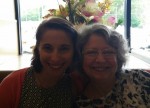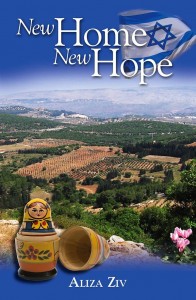Salomon Centre for American Jewish Thought fellow Eliana Rudee, left, and senior editor Joanie Berger enjoy lunch in Chicago. (photo by Paul Miller)
As I sit on a bench at the First Station in Jerusalem, just about to leave Israel for a weeklong conference in the United States, I watch the people around me on the most perfect Thursday. A bodybuilder-looking man feeds his young daughter and smiles at her as he leads the spoon of food into her mouth. Friends laugh and chat over ice cream, and couples walk hand in hand alongside the train tracks.
Suddenly, a sadness cascades over me as I get a too-familiar feeling of intense sadness that I experience every time I leave this amazing country. Some people call it the “Israel bug” and others call it “post-Israel depression.” Whatever it is, it feels like you’re about to leave something fulfilling and head towards a more robotic, mundane life. It means leaving behind the “Shabbat shaloms” heard from storekeepers on Thursdays and Fridays, and heading towards the “Merry Christmases” from storekeepers throughout December. It’s leaving behind the transcendent resonance of the shofar and heading towards elevator music while you’re on hold with the credit card company for the umpteenth time. It’s leaving the buzz of the people crowded into the shuk and heading towards the metronomic beeping as items are scanned at the grocery store. It feels like I am headed in the wrong direction.
But then I remember – I live here. I live in Israel. I am coming back in less than a week, and even though I am still sitting at the First Station in Jerusalem, I already cannot wait to come back. This is the epitome of my feelings for Israel, the land with which I am completely obsessed and the land that I am so very thankful to call home.
It was at this moment that I realized yet again that I have made the right decision by making aliya. This place truly fulfils me and fills my life with a sense of meaning that I have found only in my happiest moments elsewhere – an intimate gathering with my extended family, the moment I realized I had fallen in love, a birthday party that brought together all of my friends from the many parts of my life, and the feeling of learning something in college that changed my perspective on life.
As I write, I realize that these feelings are quite mushy-gushy, which (honestly!) is not usually how I am. So, in true rational form, I have concluded many times that I may be idealizing Israel, as my previous trips to Israel had been spent vacationing with family or new friends. But then, I think, how could I not idealize as I sit in the Jerusalem sun as the weekend hits, feeling so happy and sad at the same time? I honestly feel like a changed person in Israel.
My mom tells me that even before I was born, my personality was the same as it is today: I know what I want, I work hard to get it, I am rooted in facts and reality and I am a perpetual list-maker. I do things a little differently than most, and I like to lead others and pass along my passions. I am impatient and, because I feel so strongly about what I believe, my passion and confidence can often come off as inflexibility and stubbornness.
In Israel, much of my personality is unchanged. But I have found new parts of my personality finding expression and I think it is more a reflection of Israel than of myself. In Israel, I am quite able to express my emotions about this place, something that I would have found difficult and somewhat silly before. A new friend actually called me “artistic” the other day, something that I have not been called since I was very little.
After talking about Myers-Briggs with friends over the weekend, we decided to retake the test. After years and years of getting the same results, my personality profile shifted from “sensing” to “intuition.” This means that before I came to Israel, I paid more attention to the information absorbed through my five senses, but now I pay more attention to the information I receive through intuition. It also means that perhaps I am now a little more interested in the bigger picture than the details, the meaning behind the events, and new possibilities.
But I digress. Why I think this is worth mentioning is because I believe that something about being in Israel has changed this in me and has the power to change everyone who visits. When people have asked me why I chose to make aliya, I resort to talking about my feelings rather than rationality. (After all, I am not sure that someone who is purely rational would make this decision to move here!) I usually find myself saying something like this: “Well, there are a number of reasons why I moved here. One is because when I first came I fell in love with this place. I came back a number of times in the next several years, but it was never enough! I feel a fulfilment here that I missed when I lived in the U.S.” And then, when people look as if they want a more practical reason, I explain that my boyfriend and I were both thinking about living here before, so we chose to come together. It’s also a great place professionally, as a writer, because I write about Israel all the time. Rationally, it makes sense to be living in Israel if I am writing about Israel.
Previously, in explaining my decision to others, I would begin with the rational and move on to the emotional only if pressed to do so. But something about this place makes me tap into my emotions and intuitions. My theory about why this occurs is this: being in Israel inspires self-reflection in a way no other place does for me.
Israel’s history, culture, language and religion all relate to my past, present and future because of my identity as a Jew and my values of self-determination and freedom. My ancestors longed for the actualization of these values, died for the actualization of these values and survived for the actualization of these values. And now, I am helping to actualize these values by being in the Jewish state. This automatically triggers a cheshbon hanefesh – introspective monitoring about how well I am continuing to actualize the values that I find to be more important than my own being. I am, therefore, prompted every day here to integrate the values into my life, my actions, my choices.
As I am headed to the United States for the first time since making aliya, I reflect on the fact that even my choice to come for this week was based on these values. I believe to my core that creating the conditions for every person to find meaning in their lives should be a goal of humanity. For many Jews, finding their identity within the context of their culture, family and traditions means finding their identity within the context of Judaism. Israel is the place to find that identity, as nowhere else in the world do Jews come together like this to honor our past, present and future, actualize our values and traditions, and return to the only land that is inextricably tied to our identity as a people.
I came to the United States this week in order to be trained as a Birthright leader, someone who leads a group trip of young Jews to Israel, often for their first time, and guides them in learning about their own identity as a Jew. Birthright Israel and I share the same mission of creating the conditions for Jews to find their identity and meaning. I hope that, in this next week, I will learn to most effectively carry out this mission. And I think there is no better reason than this to leave my precious Israel, even for a week.
Eliana Rudee is a fellow with the Salomon Centre for American Jewish Thought and the author of the new “Aliya Annotated” column for jns.org. She is a graduate of Scripps College, where she studied international relations and Jewish studies. She was published in USA Today and Forbes after writing about her experiences in Israel last summer. Follow her aliya column on jns.org, facebook.com/aliyaannotated and instagram.com/israelgirl48.



